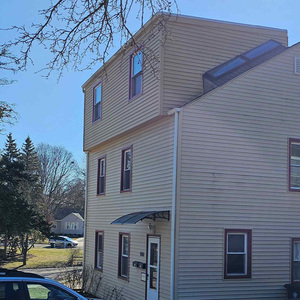I’ve been told that welded wire mesh when used in concrete slabs is primarily to keep sidewalks and patios, etc from spreading not to prevent cracking. If this is true is there any reason not to use it in a fully enclosed basement slab.
Edited 9/12/2006 10:47 pm ET by des



















Replies
other than save money?
what's more important IMO is a good base. If you have a good base you don't need it. In most the homes I've framed they almost have always had wire mesh for the basement pour, hOwever, they have all had infloor heating, so the mesh was something for the tube to be fastened too.
The mesh will make the concrete stronger , but if your base is very poor, it can still crack. Rebar is much stronger.
I asked the same question here at BT when I built my house, simply because I was used to seeing it all the time, but wasn't sure if I needed it. the feed back I got was what I told you, well compacted base, which is what I did with good results.
If its only purpose is to fasten heat tube to then forget it. The heat tube can be stapled down to the insulation with a tool that shoots barbed plastic staples into the foam.
Omitting the wire mesh reduces the chance of damage due to people walking on it during the pour, too.
Ron
Go to http://www.concretenetwork.com and all your questions will be answered.
Neither wire or rebar in concrete will prevent cracking. They are placed in the slab or wall as reinforcement for stresses placed on the concrete by its' end use design.
For an interior slab of a normal basement wire mesh may not be needed if the sub slab preperation is done correctly and the concrete is cured properly. The cure is as important as the prep in reducing and/or preventing cracking.
Dave
Try the search function, we have beaten this topic to death, but the search around here doesn't work so good all the time.
As has been pointed out, subgrade prep is crucial.
That having been said, all remesh does is maintain aggregate interlock, which helps prevent vertical displacement at the cracks that will ordinarily happen.
We can get you a crack-free slab but it will not be cheap or easy.
yea, what Cat said, I not getting into this again. just use fiber
Welded wire mesh, when used in concrete slabs that are mixed at less than 6 bags (of cement)/yard of concrete (i.e., the "6 bag mix") serves only to hold the cracked concrete pieces in one location. In concrete slabs with the proper level of cement in the mix, and all other parameters being correct (subbase, thicknes, control joints, expansion joints, etc., welded wire mesh is usless. WWM should not be confused with rebar, which is a required and necessary component of any concrete "superstructure".
It's the general opinion around this area that wire mesh is worthless in a concrete driveway, and there have been several broken up examples removed and replaced. I vote for 1/2 rebar 2 ft each way, tied.
Kinda curious -- why do I never see rebar welded? When they were doing an electrical bunker outside our building ("bunker" is the best way to describe it, given the heavy-duty rebar cage), it was all hand tied. Seemed to me that you could weld faster than they were tying, using an O/A welder, and probably a wire-feed welder or a specialized spot welder could go faster still.
If Tyranny and Oppression come to this land, it will be in the guise of fighting a foreign enemy. --James Madison
welding rebar changes the tensile strength.
alot of people dont understand, the concrete companies run the town. If you stiff lowes, you buy your lumber from HD or home town. Here there three concrete companies, they are all buddies. member of same concrete club. So if you stiff one, you stiff all three. If nobody will sell you concrete, you are out of business, for good. Concrete is territory, it doesnt travel far.we had a big contractor, over 600 employees.For year he was demanding his terms. Concrete got tired of it. quit selling. Finally all three stop selling. He moved his business north. started his little tricks again. Last I heard, contractor was in federal prision, other folk did not play his game..that same contactor tried to open his own plant. problem was the orignal concrete supplier own the cement plant too. and the sand and gravel pits.concrete supplier are great people but you dont stiff them. I have know them personal for over twenty years. the only account I can get is certfied check within 24 hours on his desk. Other than that, pay in cash in advance. most big contractor get an escrow account.
welding rebar changes the tensile strength.
Not when done correctly. Just like with regular steel fabrication, welding material has to be properly matched and the welds placed correctly. There are no strength reductions for welded rebar in the ACI code....that's not a mistake, it's rustic
I have this http://www.constructioncomplete.com/RebarTiersBattery/UTierHUT10W326.html
I have a different namebrand, but same tool.
I can tie as much as four guys with their hand tools.She said, "Tell me, are you a christion child?"
I Said, "Ma'am I am tonight" from, Walking in Memphis
November 18th, be the walker
this is the one i have
http://wis.max-ltd.co.jp/int/na/news_to_catalog.php3?productcode=RB90155She said, "Tell me, are you a christion child?"
I Said, "Ma'am I am tonight" from, Walking in Memphis
November 18th, be the walker
I notice it doesn't do a saddle tie, but I guess most manual ties I see in the US aren't done saddle.
If Tyranny and Oppression come to this land, it will be in the guise of fighting a foreign enemy. --James Madison
"Kinda curious -- why do I never see rebar welded?"It can be welded if it is an approved method. Usually it is not.
Re: tied vs welded rebar -In serious structural concrete construction while bars cross, the ones in one direction may have an entirely different design load to the ones they cross. The tie only serves as a location fix, and the two lots do not contribute any benefit to each other.Welded reinforcing mesh is a different animal altogether. It has its uses, but should not be confused with tied bar systems.A good tie is vastly superior to a bad site weld.Husat? - Mi tasol! Lukim yu behine.
Concrete is an amazing combination of very different materials. First, though, you need to recognize that things can be subjected to two different types of loads :Tensile and Compressive.
Compressive is easier to understand. Weight pressing down on something is compressive force.
Tensile is a little harder to picture; it's the opposite of compressive, the tendency to make something longer. For example, floor joist are subject to tensile forces; they try to bend - stretch- in response to loads on them.
Cement and rock have extraordinary compressive strength.
Steel has extraordinary tensile strength.
Combine the two, and you have something that will not only support great loads, but will also be able to bridge gaps, or spread the load over uneven ground, without shattering. Even if the concrete does crack, it will still carry the loads through the steel to the rest of the pour.
The amount of cement, and the type of stone used, influence the compressive strength. Generally, more cement in the mix = more compressive strength.
More steel = more tensile strength. At one extreme is the typical patio, with little or no steel. At the other extreme are the pre-stresses concrete pieces used for buildings and bridges; they almost have more steel than stone in them!
This is not to say that preparing the base can be disregarded; poor base is probably the largest cause of problems later on.
Even with the best base, it is safe to assume that large areas of concrete will eventually crack. When that happens, it is the steel that will keep the pieces together, and prevent that little crack from becoming a little canyon.
Use fiber, staple down your heat tubes.
If you use WWM, use slab bolsters, or it will do nothing.
Put relief cuts where needed, when it cracks....not if, maybe your cuts will control the crack when properly placed.
Good sub base is the primary concern IMO tamp it, then tamp it again, then final grade and tamp again.
Two guarantees with concrete is all I will give..........
IT GETS HARD, AND IT CRACKS.
Poured a bunch around here, people seem to accept that!
She said, "Tell me, are you a christion child?"
I Said, "Ma'am I am tonight" from, Walking in Memphis
November 18th, be the walker
<<Two guarantees with concrete is all I will give.......... IT GETS HARD, AND IT CRACKS.>>And a lifetime warrantee against fire and theft, too, right? <G>
You forgot fireproof and virtually theft proof.
Concrete is far from fireproof.
If Tyranny and Oppression come to this land, it will be in the guise of fighting a foreign enemy. --James Madison
Don't be silly. It sort of like that famous guy who wanted to argue the meaning of the word "is." Concrete is as fireproof as it gets. Now, is concrete affected by extreme heat? Sure. Can expansion and cooling damage it? Sure. Have we seen tall concrete and steel buildings come tumbling down? Absolutely. But, at the end of all that, what was left? Concrete. Lots of it. In a big, ugly, pile. More to the point of the thread... the guy is building a slab. How do you 'burn down' something that is laying on the ground?
I'm reminded of the folks who fell behind on the payments for their in-ground swimming pool. They figured that no one would ever try to repossess a swimming pool. They were wrong.
If Tyranny and Oppression come to this land, it will be in the guise of fighting a foreign enemy. --James Madison
our concrete company will reposses a slab in a heartbeat plus add on the price of jackhammers. it written on the ticket, if payment not in full you give permission to enter property to take reposseion. And they do it too.
That is beautiful.I need to check to see if I can actually do that legally.
It was common that when I ordered out a lot of concrete on a job that the concrete salesman would have the owner sign something to the effect of knowing about lien rights if the bill was not paid. I have never seen a concrete company of any other contractor come in and destroy a job. In fact if you did that wheer I was you would be in some serious trouble.If I had a large job and not enough to bank roll the job I would talk with the suppliers first. They always worked with me and told me they would help me if I was unable to collect. Fortunately I have only had one problem and it was not a lot of money. Not only was I a contractor but I did work for other contractors because I had a shop to do architectural millwork and other kinds of woodworking. One time I had a contractor who started paying later. I told him once and the second time he did I told him that I would not do anymore work for him. I seldom used wire mesh in any slabs because it almost useless. I have seen cases where the slab cracked and the wire mesh was sheared.A freind of mine desgns rnways and he told me that they are now designing the base batter and using a concrete with a lesser psi test and puring it thinker. As a result the runways are better.
on the subject of runways, they are in the process of replacing runway 26l/8r in atlanta right now and that is some operation to watch. Constant flow of dump trucks, concrete trucks, etc.. Almost looks choreographed. Supposed to be finished in under 60 days. Tom
Douglasville, GA
Well, there's mesh and then there's mesh. Stuff in rolls does relatively little good, other than to keep the broken pieces from getting too far away. Heavier stuff, made from about 1/4" or larger bar and supplied in stiff panels, is far superior to a half-arsed rebar job.
Critical to any reeforcment scheme is getting the steel where it will do some good. One problem with mesh is that it's too often just layed on the base (or pressed down there by folks walking on it, even though propped up in spots), and the folks pouring only do a half-hearted job of pulling it up with a rake during the pour. Any reenforcement used in a slab needs to properly supported and must withstand modest foot traffic without getting pushed down.